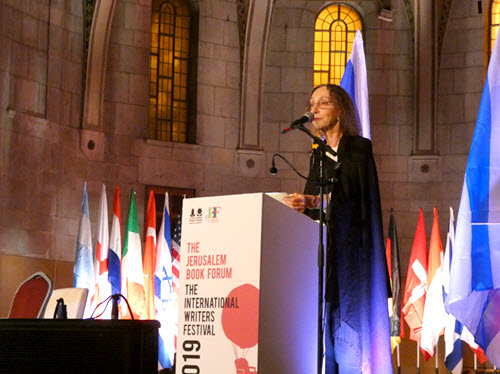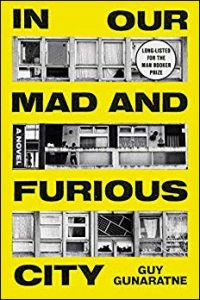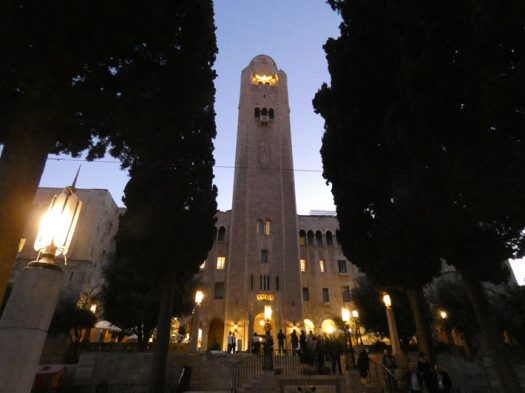The Place of Place in Our Writings
By Porter Anderson (@Porter_Anderson) | May 17, 2019 |

Joyce Carol Oates gives an acceptance speech at the opening of the Jerusalem International Book Forum on receiving the Jerusalem Prize on May 12. Image: Porter Anderson
To Start in a ‘Nowhere Place’
Overnight, we’ve had news from Wales of the win by Guy Gunaratne of the 2019 Dylan Thomas Prize for writers 39 or younger. Gunaratne’s debut novel, which also was longlisted for the Booker, is In Our Mad and Furious City. In the States, it’s published by Macmillan/FSG.
 And in his comments on winning the award, which carries a purse of US$38,347, Gunaratne made an intersting point about place–his own place, in a sense, and where it lies in his work. His reference to Neasden is about the northwest London suburb in which he grew up. He said:
And in his comments on winning the award, which carries a purse of US$38,347, Gunaratne made an intersting point about place–his own place, in a sense, and where it lies in his work. His reference to Neasden is about the northwest London suburb in which he grew up. He said:
“After winning this prize, my mind really just goes to all the other writers, or aspiring writers, who are writing from a place similar to where I began. A place like Neasden, somewhere I always thought was a nowhere place. But to make art out of the world, the language, the voices I grew up around I always felt was important. That’s all I tried to do with this book.”
The book’s politically charged story is set in northwest London and has to do with young members of minorities in London’s vast, swirling mix of so much glorious diversity–a reality sorely strained by the Brexitian bigotry that grips the UK–and the European Union with it–with unresolved hostility.
And I was struck in Gunaratne’s remarks with his concept of his home turf, his calling it “a nowhere place.” That’s familiar to many of us. My own childhood haunts in the Methodist backwaters of my father’s ministerial career seemed (and still do) like very nowhere places.
What’s impressive to me now, in looking at his book, is that he found a way deep enough into the “nowhere-ness” of his background to realize that it seemed to be right where his work needed to land: it reflects today’s struggles in which whole populations in some of the most advanced places on Earth–London, for God’s sake–feel that they’re growing up “nowhere.”
It takes a lot of perspective to get to that. You have to climb way up into the tree of your own personality to get a high enough view. It’s not easy to see your own milieu for how it might resonate with others. Granted, there can be many complex emotional and psychological reasons to write, or not, about your background, your origination, “your people,” and so on.
I once bought a large, arresting photo for my mantelpiece by a gifted artist named Timothy Sellers once. Its title is “You Will Be Found in the Place Where You Were Born” and it’s a fleeting self-portrait, the artist sighted, vulnerable for an instant, in a dense tropical greenhouse environment, an organic entity spotted on the way to some kind of unavoidable, entropic appointment.
Maybe the right question isn’t whether we can ever go home again, Mr. Wolfe, but whether we can ever really get away.
Joyce in Jerusalem

Provocations graphic by Liam Walsh
As a provocation today, I’ll tell you about something that would seem to be another author’s long, successful flight from home for tremendous accolades–and how tightly she held onto “the place where she was born” when she got there.
Joyce Carol Oates was given the Jerusalem Prize for literature at the opening of the Jerusalem International Book Forum on Sunday evening (May 12), feted with lavish appraisals of her work and music of Mozart, his 15th quartet. And it was striking to see Oates at the podium, standing in the temple-like interior of the auditorium there in Israel, giving an acceptance speech about discovering reading as a child in Lockport, New York.
Her main influence–in fact, the only family member who knew books or culture and who could have gotten her to a library–was her paternal grandmother, Blanche. Oates credits Blanche’s generosity and care in introducing her to reading–and giving her an Olivetti typewriter at age 14. As Oates had some early successes in school with her writing, her grandmother’s comment, she told us in Jerusalem, was one many of us heard from such steadfast mentors in our earlier years: “I knew you could do it.”
After Blanche died, Oates learned that her grandmother had concealed a Jewish background. The trauma of what had brought the family to the States, of course, was enough to make many hide it. But in a peculiar turn of events, Oates had grown up without any real contact with the Jewish element, however subtle, in her own backround.
And yet there she was, standing before us. The mayor of Jerusalem made an eloquent statement (“King David wrote the Psalms here, David Grossman is still writing here”), and then turned to hand Oates this major literary honor from another nation. There were hundreds of people in the house to hear her speak, the place was absolutely packed–and it was her first trip to Israel, at age 80.
The award ceremony, like the conference, was held at the Jerusalem YMCA. Hardly your Village People video, the Young Men’s Christian Association in Jerusalem is a stunning landmark, an opulent, towering complex directly across the street from the stately King David Hotel.
What had happend to place in this instance? Oates, so far from the place she’d been born, thousands of miles from Niagara County, stood onstage in the heart of Israel tossing off an intriguing line about her childhood devotion to reading: “When I was little,” she said, “my ambition was to grow up to be a book, not a writer.”
And Oates talked of how events in Europe, “so terrible,” may have “compelled my ancestors” to seek life in the New World and then to live, as her grandmother Blanche, apparently had done, without history–”not only Jewish history but any history.”
Place erased.
Joyce Carol Oates had journeying not to a spot she knew but to an ethos–a national honor embraced in faith–that may have prompted a grandmother to send her to piano lessons and encourage her to write, to be the person she is in the place we have always found her, in those books she wanted to be.
And so I’ll ask you: Do you “know your place,” as we say?–usually that’s a derogatory comment, but it doesn’t have to be. What does place mean in your work? If you were “found in the place where you were born,” where would it be? How far from a place has your writing taken you? Or how close? And what does it mean to your stories when you get there?

At the Jerusalem YMCA, May 12. Image: Porter Anderson
[coffee title=”Wish you could buy Porter a glass of Campari?” icon=”glass”]Now, thanks to tinyCoffee and PayPal, you can![/coffee]









Definitely something to the idea of place – and returning to the place you came from.
I was born in Glendale, California; grew up in Mexico City, finished college in Seattle, did grad school in Madison, Wisconsin; worked in Maryland; settled in central NJ near my work in Princeton – and remained there for 37 years, through three children and major illness.
But when my husband wanted to retire in NJ or Pennsylvania, I realized that I’d been trying to get back to California forever – and now we’re there.
And it somehow feels ‘right’ – I’m home.
Partly because none of the other places were places I felt I fit in, I’m so much more settled. The climate and weather are finally right.
I used to tell my husband that I need to be where if I miss getting out one day that happens to be nice, I haven’t given up a month of being able to get out.
It’s just that you hit it so perfectly.
There must be an age in which this happens. My four younger sisters are thoroughly denizens of Mexico City – even though the oldest of them was five when we were moved to Mexico. So I think it must be around six or seven, when children are starting to be reasonable humans. Get us at that age, and it persists.
I was born in Wyoming, raised in small-town Western Nebraska, returned to Wyoming, then moved to Eastern Nebraska. Always wanting to escape to “somewhere”, I first did so by reading and eventually spent some time as a Nanny in New York City and made several trips to South America. Perhaps me even writing, especially that I started off writing contemporary fantasy, is a result of trying to mentally escape to somewhere. My imagination allowed me to create places that were wildly interesting to me with unlimited characters and creatures.
As far as actual location is concerned, I think it’s more the Culture of Place that has influenced my writing, more than the actual place itself. I can see Wyoming (I lived in Wyoming longer than Nebraska) reflected in my character’s decisions and reactions. My newest novel idea is set in Nebraska, and it’s the first time my location matches my setting. :D
“And Oates talked of how events in Europe, “so terrible,” may have “compelled my ancestors” to seek life in the New World and then to live, as her grandmother Blanche, apparently had done, without history–”not only Jewish history but any history.”
Place erased.”
Oh, that teared me up. We must never forget.
A place very much shapes who you become. I was born and raised in India, spent most of my years in WA state, but neither place felt like home. Eight years ago we moved to Charleston, SC and I was at home right away. I cannot explain it, but it just felt right. Chs. is steeped in history; you don’t really belong unless 5 generations of your folks are buried here, yet, this place, the people are mine. I’ve not yet written any story set here…but maybe if we move down to FL, I might, lol. I’ve noticed that I hardly ever write a story set in the place where I’m currently living. I must have some distance.
Through an accident of birth I was born and raised in Peoria IL. I found my spiritual home in Southwest Louisiana. My richest characters and settings are inspired by the six years I lived in that remarkable little kingdom. No knock against Peoria. It was a matter of motivation: I just wanted to know that place and those people better.
I recently prepared my mihimihi – a traditional Maori introduction, in which you tell of your place, your people, and finally yourself. I could not say where I am from, because I was born in one place and raised shuttling between three or four other places – across two countries and at least three cultures. I’ve spent eight and a half years now in yet another place – the place of my husband – which is the longest I’ve ever lived in one place in my life.
No place is quite my place. On the other hand, I’m really good at packing. And for some reason geography seems to feature largely in my stories. And travel. Always travel…